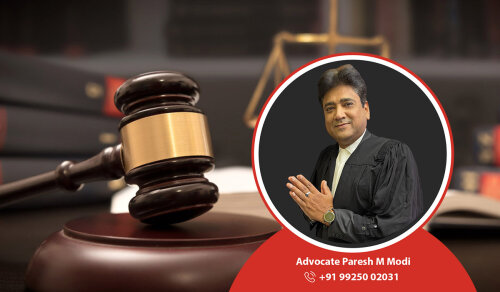Best Family Lawyers in India
Share your needs with us, get contacted by law firms.
Free. Takes 2 min.
Free Guide to Hiring a Family Lawyer
Or refine your search by selecting a city:
List of the best lawyers in India
India Family Legal Questions answered by Lawyers
Browse our 10 legal questions about Family in India and read the lawyer answers, or ask your own questions for free.
- I need consultation about whether divorce is a right decision for me not after physical abuse by my husband
- It’s been 1 and half years of my marriage my husband has abused me physically he had slapped me and hit me with belt. Although it’s the first time he’s abused me physically but during these 1 and half years of my relationship he has told me 2 or 3... Read more →
-
Lawyer answer by Qadeer Ahmad Siddiqi Law Associates
I’m truly sorry to hear what you’ve experienced. No one deserves to face physical or emotional abuse in marriage. Even a single incident of violence is taken very seriously under Pakistani law, and repeated threats or abandonment can also amount...
Read full answer - Do you assist with catholic marriage
- Resignation and also assist with church marriage
-
Lawyer answer by mohammad mehdi ghanbari
Hello, good morning Of course, I can assist you with information on how to professionally resign from a job and the requirements for a Catholic marriage. Resigning From a Job When resigning from a job, it is important to do...
Read full answer - Is it possible in same day inter religion marriage
- Is it possible in same day inter religion marriage there
-
Lawyer answer by mohammad mehdi ghanbari
Hello, good morning. Yes, it is possible to have an inter-religious marriage on the same day, but it largely depends on the laws of the country where the marriage takes place and the specific religions of the couple. Some countries...
Read full answer
India Family Legal Articles
Browse our 3 legal articles about Family in India written by expert lawyers.
- A Layman’s Guide to a Landmark Ruling on Rights of Divorced Muslim Women
- The Supreme Court of India, on 2 December 2025, delivered a judgment that carries deep significance for Muslim women across the country. The case, Rousanara Begum v. S.K. Salahuddin (2025 INSC 1375) SC Judgment of 2Dec2025, concerned a simple yet socially important question:When gifts such as cash, gold, or household... Read more →
- Delhi High Court Prescribes Prioritising Human-centric approach in granting Maintenance in Matrimonial Disputes
- The recent Judgment of the High Court of Delhi delivered on 29th October 2025 by Dr. Justice Swarana Kanta Sharma is more than just a legal ruling; it is a humane commentary on the social realities surrounding “payment of maintenance” disputes. While the case arose from a husband’s challenge to... Read more →
- Alimony under Section 25 of the Hindu Marriage Act — A Concise Survey of Law and Recent Authoritative Pronouncements by the Hon’ble Supreme Court of India and High Court of Delhi
- The present article surveys the contours of Section 25 of the Hindu Marriage Act, 1955 (HMA), which empowers matrimonial courts “exercising jurisdiction under this Act” to award permanent alimony and maintenance either at the time of passing any decree or at any point thereafter.This provision is one of the most... Read more →
About Family Law in India
Family law in India is a complex domain that addresses various relationships and issues arising within the family structure. It encompasses laws related to marriage, divorce, maintenance, child custody, adoption, inheritance, and domestic violence, among others. Family law is primarily governed by a set of personal laws based on the religious and cultural traditions of different communities, including Hindu, Muslim, Christian, and others. Statutory laws such as the Hindu Marriage Act, the Special Marriage Act, the Muslim Personal Law (Shariat) Application Act, and the Indian Divorce Act form part of this intricate legal framework.
Why You May Need a Lawyer
There are numerous situations where individuals may require legal assistance within the scope of family law in India. Some common scenarios include:
- Filing for divorce and seeking legal representation for equitable distribution of assets and liabilities.
- Pursuing custody or visitation rights for children following a separation or divorce.
- Negotiating alimony or maintenance arrangements.
- Navigating the legal process of adoption, ensuring all necessary regulatory compliance.
- Addressing domestic violence or abuse, seeking protection, and understanding rights under legal statutes.
- Settling disputes related to inheritance and succession.
Local Laws Overview
Family law in India is characterized by a blend of personal laws and statutory regulations which vary by religion and sometimes by region. Key aspects include:
- The Hindu Marriage Act, 1955: Governs marriage among Hindus, addressing issues like divorce, maintenance, and child custody.
- The Special Marriage Act, 1954: Provides a legal framework for marriages between individuals of different faiths or none at all.
- The Indian Succession Act, 1925: Governs succession and inheritance laws for Christians, Parsis, and others.
- The Muslim Personal Law (Shariat) Application Act, 1937: Governs personal matters including marriage, divorce, and inheritance for Muslims.
- Protection of Women from Domestic Violence Act, 2005: Provides protection to women from domestic violence and abuse, supporting victims with legal recourse.
- Juvenile Justice (Care and Protection of Children) Act, 2015: Addresses child protection, including adoption guidelines and child welfare.
Frequently Asked Questions
1. What is the procedure to file for divorce in India?
The procedure involves filing a divorce petition in the family court, followed by serving notice to the other spouse. The court then conducts hearings before granting a divorce decree based on facts, evidence, and legal standards.
2. Can a Hindu marry a non-Hindu in India?
Yes, a Hindu can marry a non-Hindu under the Special Marriage Act, which provides a secular framework for inter-faith marriages.
3. What are my rights if I experience domestic violence?
Under the Protection of Women from Domestic Violence Act, you have the right to seek protection orders, residence orders, and monetary relief from the court.
4. How is child custody determined in case of a divorce?
Child custody is decided based on the best interests of the child, considering factors like the child's age, parental capacity, and emotional needs.
5. What is the difference between a contested and mutual consent divorce?
In a mutual consent divorce, both parties agree to the divorce terms. A contested divorce occurs when one party does not agree, requiring court adjudication.
6. How can I adopt a child in India?
Adoption in India is governed by the Juvenile Justice Act and the Hindu Adoption and Maintenance Act. Prospective parents need to register with an authorized adoption agency and follow the legal procedures prescribed under the Act.
7. What are legal rights regarding maintenance after a divorce?
Maintenance rights are provided to ensure financial stability for a spouse who may not be in a position to support themselves post-divorce, based on court evaluations of financial needs and capabilities.
8. Who can apply for guardianship of a minor?
Parents, legal guardians, or relatives can apply for guardianship of a minor, subject to court consideration of the minor's best interests.
9. How are property and inheritance disputes resolved?
Disputes are resolved based on relevant laws such as the Hindu Succession Act or the Indian Succession Act, influenced by personal law applicable to the parties involved.
10. What options exist if I disagree with a family court's verdict?
You can appeal against a family court verdict to a higher court, typically a High Court, within a stipulated time frame, providing reasons for the appeal.
Additional Resources
Here are some resources that can provide valuable assistance:
- National Commission for Women: Provides advice and support for women facing family-related legal issues.
- Legal Services Authority: Offers free legal aid and advice to those who are eligible across India.
- Childline India Foundation: Dedicated to child welfare and protection, offering services and support.
- Local Family Courts: Direct point of contact for family legal proceedings and consultations.
Next Steps
If you require legal assistance in family matters in India, consider these steps:
- Identify the specific area of family law that you need assistance with, such as divorce, child custody, or domestic violence.
- Contact a family lawyer who specializes in the relevant area to seek professional advice and representation.
- Gather all necessary documentation and information pertinent to your case to provide a comprehensive overview to your lawyer.
- Consider seeking preliminary advice from governmental or non-governmental organizations offering legal aid, especially if you have financial constraints.
- Be prepared for the legal process by understanding relevant laws and procedures, which your lawyer can help explain.
Lawzana helps you find the best lawyers and law firms in India through a curated and pre-screened list of qualified legal professionals. Our platform offers rankings and detailed profiles of attorneys and law firms, allowing you to compare based on practice areas, including Family, experience, and client feedback.
Each profile includes a description of the firm's areas of practice, client reviews, team members and partners, year of establishment, spoken languages, office locations, contact information, social media presence, and any published articles or resources. Most firms on our platform speak English and are experienced in both local and international legal matters.
Get a quote from top-rated law firms in India — quickly, securely, and without unnecessary hassle.
Disclaimer:
The information provided on this page is for general informational purposes only and does not constitute legal advice. While we strive to ensure the accuracy and relevance of the content, legal information may change over time, and interpretations of the law can vary. You should always consult with a qualified legal professional for advice specific to your situation.
We disclaim all liability for actions taken or not taken based on the content of this page. If you believe any information is incorrect or outdated, please contact us, and we will review and update it where appropriate.
Browse family law firms by service in India
India Attorneys in related practice areas.
Browse family law firms by city in India
Refine your search by selecting a city.

















